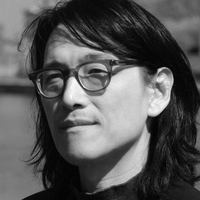The Father’s House
Here, as in childhood, Brother, no one knows us.
And someone has died, and someone is not yet
born, while our father walks through his church at night
and sets all the clocks for spring. His sleeplessness
weighs heavy on my forehead, his death almost
nothing. in the only letter he wrote to us
he says, No one can tell how long it takes a seed
to declare what death and lightning told it
while it slept. But stand at a window long enough,
late enough, and you may some night hear
a secret you’ll tomorrow, parallel to the morning,
tell on a wide, white bed, to a woman
like a sown ledge of wheat. Or you may never
tell it, who lean across the night and miles of the sea,
to arrive at a seed, in whose lamplit house
resides a thorn, or a wee man, carving
a name on a stone, at afluctuating table of water,
the name of the one who has died, the name of the one
not born unknown. Someone has died. Someone
is not yet born. And during this black interval,
I sweep all three floors of our father’s house,
and I don’t count the broom strokes; I row
up and down for nothing but love: his for me, and my own
for the threshold, as well as for the woman’s name
I hear while I sweep, as though she swept
beside me, a woman who, if she owns a face at all,
it is its own changing; and if I know her name
I know to say it so softly she need not
stop her work to hear me. But when she lies down
at night, in the room of our arrival, she’ll know
I called her, though she won’t answer, who is on her way
to sleep, until morning, which even now,
is overwhelming, the woman combing her hair opposite
the direction of my departure.
And only now and then do I lean at a jamb
to see’if I can see what I thought I heard.
I heard her ask, My love, why can’t you sleep?
and answer, Someone has died, and someone
is not yet born. Meanwhile, I hear the voices
of women telling a story in the round,
so I sit down on a rain-eaten stoop, by the saltgrasses,
and go on folding the laundry I was folding,
the everyday clothes of our everyday life, the death
clothes wearing us clean to the bone, to the very
ilium crest, where my right hand, this hand, half
crab, part bird, has often come to rest on her,
whose name I know. And because I sat down,
I hear their folding sound, and know
the tide is rising early, and I can’t hope
to trap their story told in the round. But the woman
whose name I know says, Sleep, so I lie down
on the clothes, the folded and unfolded, the life
and the death. Ages go by When I wake, the story
has changed the firmament into domain, domain
into a house. And the sun speaks the day,
unnaming, showing the story, dissipating the boundaries
of the telling, to include the one who has died
and the one not yet born. Someone has died
and someone is not yet born. How still
this morning grows about the voice of one
child reading to another, how much a house
is house at all due to one room where an elder
child reads to his brother, and that younger
knows by heart the brother-voice. How darker
other rooms stand, how slow morning comes, collected
in a name, told at one sill and listened for
at the threshold of dew What book is this we read
together, Brother, and at which window
of our father’s house? In which upper room?
We read it twice: Once in two voices, to each
other; once in unison, to children,
animals, and the sun, our star, that vast office
of love, the one we sit in once, and read
together twice, the third time bosomed in
the future. So birds may lend their church, sown
in air, realized in the body uttering
windows, growing rafters, couching seeds.

